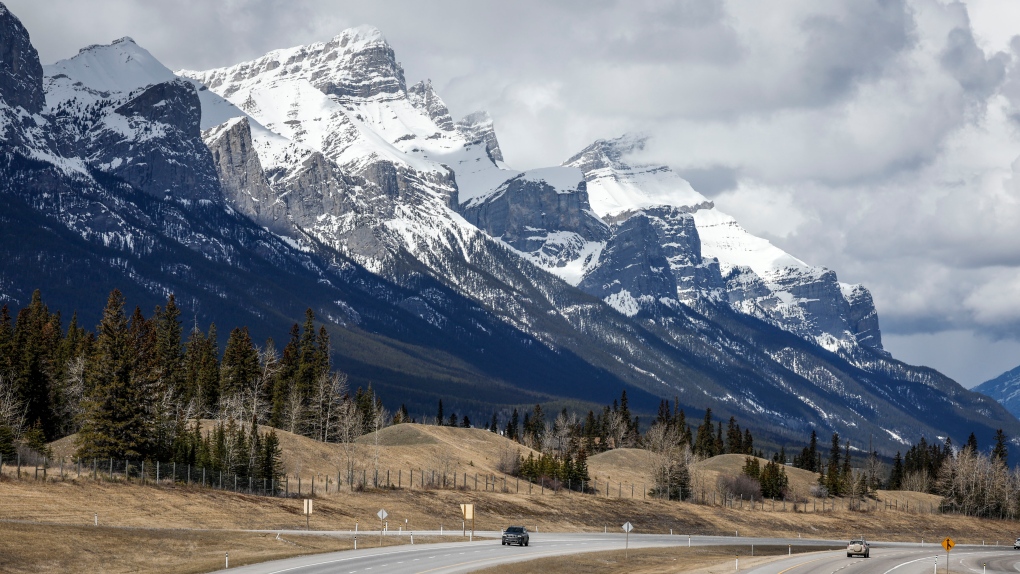Early snowmelt in Western mountains means drier summers, more wildfire risk: study
 Traffic travels along the Trans Canada Highway past Mount Rundle of the Rocky Mountains near Canmore, Alta., Monday, April 24, 2023.THE CANADIAN PRESS/Jeff McIntosh
Traffic travels along the Trans Canada Highway past Mount Rundle of the Rocky Mountains near Canmore, Alta., Monday, April 24, 2023.THE CANADIAN PRESS/Jeff McIntosh
VANCOUVER - Leaner snowpack in Western Canada and United States mountain ranges is causing drier summers and increasing wildfire risk, says a new study from the University of Colorado Boulder.
Lead author Kate Hale said her team analyzed mountain snow data and found snowpack water storage decreased more than 25 per cent from 1950 to 2013. This, she said, can be attributed to earlier snowmelt, less snowfall and more rain.
“We actually saw some of the strongest signals up in the Canadian Rockies, by way of this decrease in snowfall and then earlier snowmelts and rainfall generation,” Hale said in an interview.
Snowmelt serves as the primary water resource in western mountain regions, the study says. The ranges store snow throughout the winter, which then melts during spring and summer months when demand for water peaks.
Hale said snow in these regions typically wouldn't start melting until late May or June, but has begun showing signs of snow thawing as early as March.
Such a shift in snowmelt may pose challenges for residents as much of the infrastructure in these regions were designed to adapt to when water becomes available, Hale said.
“The snowmelts are providing most of the downstream water resources, such that if there is more snowmelt occurring earlier in the year, that means there will be less available for later in the year,” she said.
Holly Chubb, a climate researcher at the University of British Columbia, agreed, saying a serious decline in the snowpack would cause “cascading issues” for energy security in B.C.
“We rely on hydroelectric power as a major source to power our businesses, our homes and our schools, and the hydroelectric power is generally fed from the glacier, which fills our reservoirs,” she said in an interview.
“We may have to really adjust our usage, our consumption, and think about actually how we are utilizing hydro power in B.C.”
She said changes in snowmelt may impact soil and lead to an increase in the size and duration of wildfires.
It could also disrupt wildlife, she added. For instance, she said early snowmelt could shift the volume and temperature of rivers, which could prevent fish from spawning and reduce the province's salmon population.
“All of this information about the timing of snow melting is really, really essential to our cultural, economic and general energy security in British Columbia,” she said.
She suggested governments follow advice from Indigenous leaders.
“They have seen the changes in this landscape for thousands of years,” she said. “They have a deep knowledge and relationship with the land, with salmon, with bears that we do not have and that knowledge system is incredibly valuable.”
This report by The Canadian Press was first published May 28, 2023.
This story was produced with the financial assistance of the Meta and Canadian Press News Fellowship.
CTVNews.ca Top Stories

Budget 2024 'likely to be the worst' in decades, former BoC governor says
Without having seen it, former Bank of Canada governor David Dodge believes that Tuesday's 2024 federal budget from Deputy Prime Minister and Finance Minister Chrystia Freeland is 'likely to be the worst budget' in decades.
What's at stake for Canada after Iran's unprecedented attack on Israel
Following the Iranian missile and drone strikes against Israel over the weekend, Canada should take the threat of Iran and potential escalation of the conflict seriously, one global affairs analyst says.
Former B.C. school trustee's 'strip-tease artist' remark was defamatory, judge rules
A controversial former school trustee from B.C.'s Fraser Valley who described a political rival as a "strip-tease artist" during an election campaign has been ordered to pay her $45,000 for defamation.
'A sense of urgency': Sask. man accused of abducting daughter calls himself to the stand during trial
Michael Gordon Jackson, the man on trial after being charged with contravention of a custody order for allegedly abducting his daughter in late 2021 to prevent her from getting a COVID-19 vaccine, called himself to the stand Monday.
Kingston, Ont.'s Aaliyah Edwards drafted into WNBA
After four years at the University of Connecticut, Edwards was selected sixth overall by the Washington Mystics in the WNBA draft Monday night.
NASA confirms mystery object that crashed through roof of Florida home came from space station
NASA confirmed Monday that a mystery object that crashed through the roof of a Florida home last month was a chunk of space junk from equipment discarded at the International Space Station.
A knife attack in Australia against a bishop and a priest is being treated as terrorism, police say
Horrified worshippers watched online and in person as a bishop was stabbed at the altar during a church service in Sydney on Sunday evening.
Body of 14-year-old boy pulled from Lake Ontario, police say he drowned while swimming
The body of a 14-year-old boy has been pulled from Lake Ontario after police say he drowned while swimming near Ashbridges Bay Park on Sunday night.
'Rust' armourer gets 18 months in prison for fatal shooting by Alec Baldwin on set
A movie weapons supervisor was sentenced to 18 months in prison in the fatal shooting of a cinematographer by Alec Baldwin on the set of 'Rust.'
































